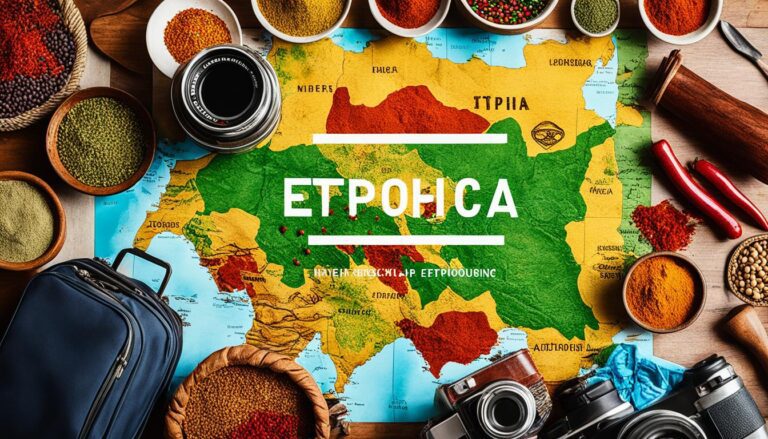Is Ethiopia Good to Visit?
Did you know that Ethiopia is home to nine UNESCO World Heritage Sites, making it one of the most culturally rich and diverse countries in Africa? With its ancient landmarks, breathtaking landscapes, and vibrant traditions, Ethiopia offers a unique travel experience that is sure to captivate curious adventurers.
While it’s important to be aware of certain security concerns in certain regions, overall, Ethiopia is considered a safe destination for tourists, especially in the capital city of Addis Ababa. By taking necessary precautions and being prepared, you can explore the wonders of this remarkable country and have an unforgettable journey.
Key Takeaways
- Ethiopia is home to nine UNESCO World Heritage Sites, showcasing its rich cultural heritage.
- While there are some security concerns in certain regions, the overall safety situation in Ethiopia is stable.
- Visiting Ethiopia provides an opportunity to experience ancient landmarks, stunning landscapes, and vibrant traditions.
- Being prepared and taking necessary precautions will ensure a safe and memorable trip to Ethiopia.
- By exploring Ethiopia, you can embark on a journey filled with cultural immersion and breathtaking sights.
What You Can Expect to See
When it comes to exploring Ethiopia, you’ll be amazed by the incredible diversity of attractions that await you. From historic landmarks to vibrant tribes and breathtaking landscapes, this country has something for everyone. Get ready to embark on a truly memorable journey through Ethiopia’s tourist spots!
“Ethiopia offers a range of attractions for visitors, including historic sights, vibrant tribes, and stunning landscapes.”
One of the must-visit destinations in Ethiopia is Lalibela, a UNESCO World Heritage Site famous for its ancient rock-hewn churches. These remarkable structures carved out of solid rock are a testament to the country’s rich religious history and architectural marvels.
Aksum, known as the “Cradle of Ethiopian Civilization,” is another place that should be on your itinerary. Explore the fascinating ruins of the ancient Aksumite Empire, including towering obelisks, royal tombs, and the Church of St. Mary of Zion.
If you’re interested in immersing yourself in Ethiopia’s diverse cultures and tribes, the Omo Valley is the place to be. This region is home to numerous ethnic groups, each with its own unique traditions and customs. Engage with the local communities, witness colorful festivals, and learn about their way of life.
For the adventurous souls, don’t miss out on the Danakil Depression. This otherworldly landscape is characterized by sulfur springs, active volcanoes, and salt flats, creating a surreal experience that will leave you in awe.
Top Tourist Spots in Ethiopia:
| Destination | Description |
|---|---|
| Lalibela | Home to ancient rock-hewn churches |
| Aksum | Historical ruins of the Aksumite Empire |
| Omo Valley | Diverse cultures and tribes |
| Danakil Depression | Geographic wonder with sulfur springs and salt flats |
It’s important to note that Ethiopia is not a typical safari destination like Kenya or Tanzania. Instead, it offers a unique blend of history, culture, and natural beauty. So, while you won’t find the Big Five here, you’ll be treated to an enriching and authentic experience that will stay with you forever.
Continue reading our Ethiopia travel guide for more tips and insights on exploring this captivating country.
Getting Around Ethiopia
When traveling within Ethiopia, there are various transportation options available to explore this diverse country. Most tourists fly into the capital city, Addis Ababa, which serves as the primary gateway to other destinations. From Addis Ababa, you can choose to travel by air, bus, or hire a private driver, depending on your preferences and budget.
If you’re looking for convenience and efficiency, domestic flights are a popular choice. They offer a time-saving option, especially when traveling to remote destinations like Lalibela, known for its ancient rock-cut churches. Domestic airlines such as Ethiopian Airlines provide regular flights to major cities and tourist destinations.
For budget-conscious travelers, bus travel is a viable alternative. Ethiopia has an extensive network of public buses that connect various cities and towns. Although bus journeys can be lengthy, they provide an affordable means of exploring the country. It’s important to note that bus schedules and conditions may vary, so it’s advisable to research and plan your trips accordingly.
If you prefer a more personalized and flexible travel experience, hiring a private driver is an excellent option. This allows you to tailor your itinerary and explore Ethiopia at your own pace. Many local tour operators offer driver services with knowledgeable guides who can enhance your travel experience by providing insights into the country’s culture, history, and attractions.
Tips for Getting Around Ethiopia:
- Plan Ahead: Research your transportation options and plan your itinerary in advance to make the most of your trip.
- Be Prepared for Delays: Travel times in Ethiopia can be unpredictable, so it’s essential to factor in potential delays and allocate extra time for your journeys.
- Monitor Local Conditions: Stay informed about the current situation in the areas you plan to visit. Keep an eye on travel advisories and local news for any updates that may affect your travel plans.
- Make sure you have travel insurance.
“Traveling—it leaves you speechless, then turns you into a storyteller.” – Ibn Battuta
Exploring Ethiopia’s diverse landscapes, historical sites, and cultural treasures requires efficient and reliable transportation. Whether you choose to fly, take a bus, or hire a private driver, there are options to suit every traveler’s needs. By planning ahead and staying informed, you can navigate Ethiopia’s roads and reach your desired destinations with ease.
| Transportation Option | Advantages | Disadvantages |
|---|---|---|
| Air Travel | Convenient and time-saving | Relatively expensive |
| Bus | Affordable option | Long travel times and variable conditions |
| Private Driver | Flexible and personalized experience | Higher cost |
The Rich Culture of Ethiopia

Ethiopia is home to a vibrant and diverse culture that is deeply rooted in ancient traditions and customs. Its rich cultural heritage offers a unique experience for travelers seeking to immerse themselves in the local way of life.
Unique Cultural Practices
One of the fascinating aspects of Ethiopian culture is its distinct practices. For instance, the Ethiopian calendar follows a different system than the standard 24-hour clock, adding an intriguing dimension to the daily lives of the people. This calendar has twelve months of 30 days each and a 13th month with five days or six days in a leap year. It showcases the country’s deep connection to its historical roots.
Handshakes are another interesting cultural practice in Ethiopia. Instead of a typical handshake, Ethiopians have a specific gesture that involves touching hands and shoulders. This gesture signifies warmth, respect, and friendship, and it is a common way of greeting each other.
Diverse Tribes and Languages
Ethiopia is known for its ethnic diversity and is home to numerous tribes, each with its own unique customs, languages, and traditions. Exploring the different tribes offers visitors a glimpse into the country’s multicultural fabric. Some of the notable tribes include the Oromo, Amhara, and Tigray, each with distinct cultural practices and languages.
“Ethiopian culture is incredibly diverse, with each tribe offering its distinctive traditions and heritage. Experiencing the cultural richness of Ethiopia is truly awe-inspiring.”
Visitors to Ethiopia have the opportunity to witness traditional ceremonies, dances, music, and folklore that have been passed down through generations. From the unique clothing styles to traditional wedding rituals, every aspect of daily life showcases the country’s vibrant cultural tapestry.
Furthermore, the Ethiopian Orthodox Church plays a significant role in the cultural fabric of the country. Its ancient traditions and religious festivities are deeply intertwined with Ethiopian culture, creating a harmonious blend of religion and tradition.
Visual Representation of Ethiopia’s Cultural Diversity
| Tribes | Distinctive Customs and Languages |
|---|---|
| Oromo | Traditional hand-woven clothes and the Gadaa system of governance |
| Amhara | Traditional music and dance, including the famous Eskista dance |
| Tigray | Ancient rock-hewn churches and the Geez language |
These are just a few examples of the diverse tribes and their unique customs found in Ethiopia. Each tribe contributes to the country’s cultural mosaic, making Ethiopia a truly captivating destination for those interested in immersing themselves in rich and ancient traditions.
Traveling through Ethiopia provides an opportunity to connect with a culture that has remained largely untouched by globalization, providing an authentic and immersive experience that will leave a lasting impression.
The Cuisine of Ethiopia
When it comes to Ethiopian cuisine, prepare your taste buds for an extraordinary culinary journey. One of the standout dishes is injera, a pancake-like flatbread that serves as the foundation for many Ethiopian meals. Soft and slightly tangy, injera is made from fermented teff flour and is typically served with a variety of flavorful stews known as wats. What makes injera truly unique is the way it is enjoyed – with your hands! It’s the perfect opportunity to savor every bite and connect with the rich traditions of Ethiopian dining.
Ethiopia is also renowned for its vegetarian-friendly options, making it a haven for plant-based food enthusiasts. From lentils and chickpeas to mixed vegetable stews, you’ll find a diverse array of delicious vegetarian dishes that showcase the country’s vibrant flavors and spices.
No trip to Ethiopia would be complete without indulging in its world-famous coffee. Ethiopia is, after all, the birthplace of this beloved beverage. Discover the art of Ethiopian coffee ceremonies, where freshly roasted coffee beans are ground by hand and brewed in traditional clay pots known as jebenas. Immerse yourself in the captivating aromas and flavors of this time-honored ritual, and savor every sip of the rich and aromatic Ethiopian coffee.
Another culinary treasure in Ethiopia is its local honey. Produced from the country’s diverse flora, Ethiopian honey boasts a remarkable range of flavors and textures. Each region offers unique honey varieties, giving visitors the opportunity to refine their taste buds by sampling different types of this delectable natural sweetener. Be sure to try some Ethiopian honey and enrich your gastronomic adventure with its distinct flavors.
“Ethiopian cuisine is a celebration of flavors, traditions, and community. From the tangy injera to the aromatic coffee ceremonies, every bite and sip tells a story of Ethiopia’s culinary heritage.”
| Must-Try Ethiopian Dishes | Description |
|---|---|
| Injera | A sourdough flatbread made from teff flour and served with various stews and sauces. |
| Kitfo | Finely minced raw beef, seasoned with spices and served with injera or bread. |
| Doro Wat | A spicy chicken stew cooked with berbere spice and served with injera. |
| Tibs | Grilled or sautéed pieces of meat (commonly beef or lamb) seasoned with spices and served with injera or bread. |
Safety and Security in Ethiopia

While traveling to Ethiopia, the safety and security of our visitors is our utmost priority. Although Ethiopia is generally considered safe for tourists, it is important to remain vigilant and aware of your surroundings throughout your trip. Here are some essential travel tips to ensure a safe and enjoyable experience:
- Stay informed about travel advisories: Keep yourself updated on the latest travel advisories, particularly for specific regions. Due to sporadic violent conflict, civil unrest, and crime, certain areas may be unstable. It is recommended to avoid these regions to ensure your safety.
- Be cautious when using public transportation: While public transportation is a common and affordable way to get around Ethiopia, it is crucial to exercise caution. Keep an eye on your belongings and be mindful of pickpockets. If possible, opt for reputable transportation services or hire a private driver for added convenience and safety.
- Prepare for delays in travel times: When traveling in Ethiopia, it is important to be prepared for delays. Whether you are taking a domestic flight or using public transportation, unforeseen circumstances such as weather conditions or road closures can cause travel disruptions. Plan your itinerary with some flexibility to accommodate any potential delays.
Despite these precautions, it is important to note that Ethiopians are known for their hospitality and friendliness towards visitors. The majority of interactions with locals will be positive, adding to the charm of your trip. By taking necessary precautions and staying alert, you can enjoy the beauty of Ethiopia while ensuring a safe journey.
“Safety and security are our top priorities, and by following these travel tips, you can have a memorable experience exploring Ethiopia’s rich cultural heritage and breathtaking landscapes.”
Essential Tips for Traveling in Ethiopia
When planning your trip to Ethiopia, it’s important to keep certain tips in mind to ensure a smooth and enjoyable experience. Here are some essential travel tips to help you make the most of your visit:
- Carry copies of your passport and visa: It is recommended to carry a copy of your passport and visa while keeping the originals in a safe place. This will come in handy in case of loss or theft.
- Have evacuation plans in place: It’s a good idea to have evacuation plans that don’t rely on government assistance. Familiarize yourself with local emergency procedures and enroll in the Smart Traveler Enrollment Program for alerts and emergency support.
- Expect limited internet access: Outside of major cities, internet access in Ethiopia may be limited. Be prepared for slower internet speeds or intermittent connectivity.
- Consider public toilet standards: Public toilets in Ethiopia may not always meet Western standards. It’s advisable to carry toilet paper and hand sanitizer with you for a more comfortable experience.
- Bargain when shopping or using services: Bargaining is a common practice in Ethiopia, especially in markets. Don’t be afraid to negotiate prices to get the best deal.
By following these essential tips, you’ll be well-prepared for your trip to Ethiopia and able to make the most of your time exploring this fascinating country.
Travel Tips Recap:
| Tips | Description |
|---|---|
| Carry copies of your passport and visa | Keep copies of your passport and visa in case of loss or theft. |
| Have evacuation plans | Ensure you have evacuation plans that don’t rely on government assistance. |
| Expect limited internet access | Be prepared for limited internet access, especially outside major cities. |
| Consider public toilet standards | Take into account that public toilets may not meet Western standards. |
| Bargain when shopping or using services | Embrace the practice of bargaining to get the best prices. |
The Best Time to Visit Ethiopia

When planning a trip to Ethiopia, it’s crucial to choose the right time to make the most of your travel experience. The best time to visit Ethiopia is during the dry season, which typically runs from October to April. The weather during this period is pleasant, making it ideal for exploring the country’s diverse attractions and breathtaking landscapes.
During the dry season, you can embark on a journey to discover Ethiopia’s stunning national parks, ancient historical sites, and vibrant cultural heritage. Whether you’re exploring the rock-hewn churches of Lalibela, trekking through the Simien Mountains, or immersing yourself in the rich traditions of the Omo Valley tribes, the dry season offers the perfect conditions for unforgettable adventures.
On the other hand, the rainy season in Ethiopia extends from May to September. While this period can bring lush greenery and picturesque views, it can also pose challenges for travelers. Some roads may become impassable due to heavy rainfall, making travel more difficult.
It’s important to note that Ethiopia has diverse climates, and weather conditions can vary depending on the region you plan to visit. Before finalizing your travel plans, it is advisable to check the specific weather patterns for your desired destinations. This will help you tailor your itinerary and ensure you make the most of your time in Ethiopia.
Ultimately, the best time to visit Ethiopia is a personal decision based on your preferences and the experiences you seek. Whether you choose to explore the country during the dry season or embrace the beauty of the rainy season, Ethiopia’s attractions and cultural heritage will leave a lasting impression on your journey.
Now, let’s take a look at a table that summarizes the different seasons in Ethiopia and their characteristics:
| Season | Time of Year | Weather | Advantages | Disadvantages |
|---|---|---|---|---|
| Dry Season | October to April | Pleasant and mild | Optimal for outdoor activities and sightseeing | Higher number of travelers |
| Rainy Season | May to September | Increased rainfall | Lush landscapes and vibrant greenery | Potential road closures and travel difficulties |
As you can see from the table and considering the image above, the best time to visit Ethiopia largely depends on your travel preferences, tolerance for varying weather conditions, and the specific destinations you plan to explore.
In the next section, we’ll provide some essential tips to help you make the most of your trip to Ethiopia. Stay tuned!
Conclusion
In conclusion, Ethiopia offers a unique travel experience that combines rich culture, historic landmarks, and stunning landscapes. Whether you’re exploring the ancient churches of Lalibela, discovering the diverse tribes in the Omo Valley, or marveling at the natural wonders of the Danakil Depression, Ethiopia has something to offer every traveler.
While it’s important to note that certain regions have travel advisories due to security concerns, the country as a whole is considered safe for tourists. By staying informed about local events, taking necessary precautions, and being aware of your surroundings, you can ensure a smooth and enjoyable trip.
It’s also worth mentioning that Ethiopia may present some challenges, such as potential delays in travel times and limited internet access in remote areas. However, with proper planning and preparation, these obstacles can be overcome, and you can fully immerse yourself in the authentic and vibrant Ethiopian experience.
So, whether you’re seeking a cultural adventure, historical exploration, or breathtaking landscapes, consider Ethiopia for your next vacation. With its fascinating attractions, warm hospitality, and endless vacation ideas, Ethiopia is truly a hidden gem waiting to be discovered.



